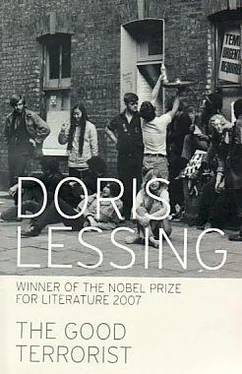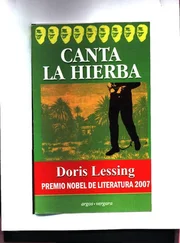The smell of paint was very strong. Soon Jasper said he couldn't sleep in it and went upstairs. His tone was such that Alice did not dare to go with him. She went down into the sitting room for the night.
She slept badly, often waking to listen so that she would not miss his going in the morning. She heard the two men come down the stairs and go into the kitchen. She followed them; felt herself already excluded, not wanted. It was only six, a fresh sunny chilly late-spring morning.
It seemed to Alice that Jasper hardly saw her as he went off. He waved to her from the gate, where she stood like any housewife seeing off her man.
She went back to her sleeping bag, with the feeling that a lot of time had to be got through before Jasper came home to her.
But the days went by pleasantly. Pat was infinitely available to Alice, helping with painting and cleaning; between them the two women accomplished miracles, dingy caves being transformed one after another to fresh and lively rooms. Pat was funny and sweet, agreeable, entertaining. Alice opened and expanded in this normality, this ease, and thought again how much of her time was spent with a tightened heart and grim expectation of another put-down from Jasper. Yet, while she enjoyed it all, liked Pat, felt she had never been so happy, she was thinking, Yes, but this is how people behave when they have decided to go away: in a sense she has already left.
Philip, affectionately supported by the two women, got the hot-water system working. They all had celebratory baths. Even Faye did, when encouraged by Roberta. Philip went back onto the roof and finished the tiling. He replaced floors and fallen plaster, mended the machineries of lavatory cisterns, and, borrowing the car from next door, got new piping to replace old. He found a thrown-away central-heating panel or two, and there was real heating. He located two great beams of good timber lying on a waste lot half a mile away, but could not lift them; they would have to wait for Bert and Jasper to help him.
Between Alice and Mary and Reggie took place the accounting session that would bring in a regular contribution to the household. Mary, who of course knew exactly what would have to be paid, had already worked out her and Reggie's shares. It was very little. Electricity, gas? With ten in the house, what could that come to? An assessment was made. Water? The Water Board had not yet caught up with them. It seemed this was as far as the couple had thought; as though that would be it. Alice said dryly that this and this and this had been brought in.
"Yes, but from the skips," said Mary sharply, betraying that she had not omitted to notice what was being brought in.
This was taking place at the kitchen table. Reggie and Mary opposite each other, so amiable and self-assured; Alice sitting at the head of that table, waiting for what would come her way. She knew already. She could see in Mary's eyes a gleam that meant she was calculating, not what she might owe to Alice, but what she was accumulating, of course at the moment only in imagination, for the purchase of their flat, or house.
Alice said, "We've paid for the gas boiler, for a lot of cable, for tools, for wood, for glass."
She did not expect very much. Rightly. Glances flew back and forth between Reggie and Mary, and a sum of twenty pounds was offered and accepted.
No mention was made of Philip's work. Alice could positively hear the thought: But of course he wouldn't do it if he weren't going to live here.
Smiling, even demure, Alice accepted the tea that Mary offered to prepare - out of guilt, of course - and looked at the other two and thought: God, how I hate you people. How I hate your mean, scrimping, grabbing, greedy guts. Because she knew she swelled and paled, in the grip of her look, she smiled even more and then invited them to start talking about their plans for their future home, which they did at once, and ceased to notice her.
Jim took the letter to Cedric Mellings, and came back limp and weepy with happiness. He could start tomorrow. By chance someone was leaving. By chance, Jim would suit Cedric Mellings very well. Jim could look forward, too, to training in the new technical mysteries.
Alice said sharply, "Guilty conscience. That lot - it's all guilt with them."
Jim said, "He's very nice, Alice. He was very nice to me." They were in the kitchen. Jim, seated, or perched, on his chair, could not settle, but got up and stumbled about, laughing helplessly, or sat and laid his head on the table and laughed, sounding as if he wept, then, in an excess of happiness and gratitude, banged his two fists on either side of his head, which banging turned into a little sharp jubilant rhythm. Next he sat up and flung wide his arms in the same movement, his eyes rolling, his black face smiling wide, white teeth showing.
Alice, with a thousand terrible things to say about her father, kept them back, because she loved Jim, loved his helplessness, his vulnerability, and her own part in alleviating these wounds; because she knew this man, or boy - he was twenty-two - was really sweet, had a sweet gentle warmth in him; and she knew that a spell of happiness, of success, would transform him. She could imagine how he would be, earning money, taking command of his life. She could see him clearly: Jim as he was now, but filled out with confidence and new skills. Therefore, she said not one more word about her shitty father, but only listened, sharing in what she knew was a moment in his life he could never forget.
Then she took him out to supper to celebrate, Philip and Pat joining in, and the evening became one of those when the participants have to pause, to say to themselves: Yes, this is me, it really is me.... Happiness sat with them at the table in the Seashell Fish-and-Chips; they could not stop smiling, or Jim from laughing and sighing. When he said, "I can't believe this is me, man," they looked at one another, unable to bear that they could not express what they felt for him, but they could laugh, and - it was Pat who sat next to him - stroke or pat him, or embrace him. The other people in the restaurant, who might at other times have had stringent thoughts about race, or about white women publicly embracing black men (or at least not with such total lack of self-consciousness), were, it could be seen from faces that also showed tendencies to laugh without reason, subdued to the demand of the occasion, which was for a total and uncritical abandon to happiness.
The four went back to number 43, in a close, tender group, Jim as king, as victor, and, unwilling that the evening should be lost, they sat on around the kitchen table, sentinelled by the yellow forsythia, and could not bear to part.
Alice was already thinking: Yes, tonight you'd think we'll all be friends for life, we could never harm each other, but it could all change, just like that! Oh, she knew, she had seen it all. Her heart could have ached, could have dragged her down, but she did not let it, was keeping that lump of a heart on a short, cruel chain like a dangerous dog.
A postcard showing the Wicklow Mountains arrived from Jasper, with the message "Wish you were here!" She knew exactly the freakish mood he had been in, and her face assumed that smile the thought of Jasper so often evoked: modest, wistful, and admiring, as if his vagaries of genius would forever be beyond her. She kept the card to herself because she knew the others would not understand. Coming downstairs early, long before the others, she had seen it lying on the floor inside the door.
Jim went off for his first day at work in a mood of tender incredulity, still unable to stop smiling.
Pat, instead of joining Alice in their scrubbing and painting, went off to "a friend," came back saying that Bert had telephoned a message. All was well, and they would be back soon.
Читать дальше











